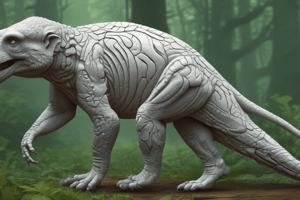Podcast
Questions and Answers
What is genetic drift in the context of evolution?
What is genetic drift in the context of evolution?
- A random change in allele frequencies within populations (correct)
- The exchange of genetic material between populations due to migration
- The choice of mates based on non-random factors
- A directed change in DNA sequences
Which mechanism of evolution involves the exchange of genetic material between populations due to migration?
Which mechanism of evolution involves the exchange of genetic material between populations due to migration?
- Gene flow (correct)
- Genetic drift
- Mutation
- Sexual selection
How do fossils support the theory of evolution?
How do fossils support the theory of evolution?
- By revealing evolutionary relationships through sexual selection
- By providing evidence of directed changes in DNA sequences
- By revealing chronological record of life forms over time (correct)
- By showing similarities in anatomical structures across species
What does comparative anatomy and embryology suggest about species?
What does comparative anatomy and embryology suggest about species?
In the context of evolution, what does molecular biology, particularly DNA and protein sequences, reveal?
In the context of evolution, what does molecular biology, particularly DNA and protein sequences, reveal?
Which area of contemporary research efforts in evolution focuses on revealing evolutionary relationships between species?
Which area of contemporary research efforts in evolution focuses on revealing evolutionary relationships between species?
What is the driving force behind evolution, as proposed by Darwin?
What is the driving force behind evolution, as proposed by Darwin?
Who, along with Darwin, established the theory of evolution in the 19th century?
Who, along with Darwin, established the theory of evolution in the 19th century?
Which of the following is a key aspect of natural selection?
Which of the following is a key aspect of natural selection?
Who discovered the laws of inheritance that play a pivotal role in evolution?
Who discovered the laws of inheritance that play a pivotal role in evolution?
What process leads to an organism's increased fitness within its environment?
What process leads to an organism's increased fitness within its environment?
Which discovery has contributed significantly to our understanding of evolution's genetic basis?
Which discovery has contributed significantly to our understanding of evolution's genetic basis?
Study Notes
Evolution in Biology: A Comprehensive Overview
Evolution, a fundamental tenet of biology, is the process by which species change over time. This dynamic process has captivated scientists and philosophers alike, shedding light on the intricate web of life's diverse forms. This article will explore the core aspects of evolution, encompassing both its historical development and contemporary research.
Historical Foundations
Evolution's roots are deeply embedded in history, with seminal figures such as Darwin and Wallace establishing the theory in the 19th century. Darwin's "On the Origin of Species" proposed natural selection as the driving force behind evolution, while Wallace's work on heredity and variation further refined the theory.
Natural Selection and Adaptation
Natural selection forms the bedrock of evolution, where favorable traits are more likely to be passed on to future generations due to increased survival and reproduction. This process leads to adaptations that increase an organism's fitness within its environment (i.e., its ability to survive and reproduce).
Genetics and Heredity
Genetics plays a pivotal role in evolution by determining how traits are inherited and transferred between generations. Mendel's laws of inheritance, the discovery of DNA, and the advent of molecular biology have all contributed to our understanding of evolution's genetic basis.
Species Diversity
Darwin's theory of evolution by natural selection offers a compelling explanation for the diversity of life forms on Earth. As species diverge and adapt to their environments, new species and taxonomic groups emerge.
Mechanisms of Evolution
Several mechanisms support the process of evolution, including:
- Genetic drift: Random changes in allele frequencies within populations.
- Gene flow: The exchange of genetic material between populations due to migration.
- Mutation: Spontaneous changes in DNA sequences.
- Sexual selection: Choice of mates based on non-random factors, leading to the spread of advantageous traits.
Evidence for Evolution
A multitude of independent lines of evidence support the theory of evolution, including:
- Fossil records: Fossils provide a chronological record of life forms over time, revealing evolutionary relationships and changes in species.
- Comparative anatomy and embryology: Similarities in anatomical structures and embryological development across species indicate common ancestry.
- Molecular biology: DNA and protein sequences reveal evolutionary relationships and provide insights into genetic changes leading to new species.
Contemporary Research
Efforts to decipher the evolutionary past have expanded to include phylogenetics, genomics, and bioinformatics. For instance, phylogenetic trees based on molecular data reveal evolutionary relationships between species, while comparative genomics reveals the genetic basis of adaptation.
Conclusion
The theory of evolution, a cornerstone of modern biology, provides a robust framework for understanding the diversity of life and the interconnectedness of all living organisms. As research continues to expand and refine our understanding of this process, evolution's importance will only grow.
Studying That Suits You
Use AI to generate personalized quizzes and flashcards to suit your learning preferences.
Description
Test your knowledge on evolution in biology with this comprehensive quiz covering historical foundations, natural selection, genetics, species diversity, mechanisms of evolution, evidence supporting evolution, and contemporary research areas.




